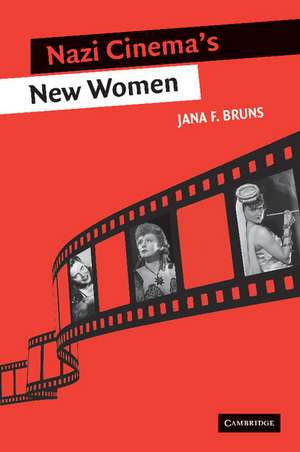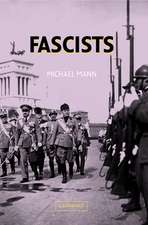Nazi Cinema's New Women
Autor Jana F. Brunsen Limba Engleză Paperback – 18 iul 2012
| Toate formatele și edițiile | Preț | Express |
|---|---|---|
| Paperback (1) | 324.15 lei 43-57 zile | |
| Cambridge University Press – 18 iul 2012 | 324.15 lei 43-57 zile | |
| Hardback (1) | 695.06 lei 43-57 zile | |
| Cambridge University Press – 26 apr 2009 | 695.06 lei 43-57 zile |
Preț: 324.15 lei
Nou
Puncte Express: 486
Preț estimativ în valută:
62.05€ • 67.42$ • 52.15£
62.05€ • 67.42$ • 52.15£
Carte tipărită la comandă
Livrare economică 21 aprilie-05 mai
Preluare comenzi: 021 569.72.76
Specificații
ISBN-13: 9781107405103
ISBN-10: 1107405106
Pagini: 286
Dimensiuni: 152 x 229 x 16 mm
Greutate: 0.42 kg
Editura: Cambridge University Press
Colecția Cambridge University Press
Locul publicării:New York, United States
ISBN-10: 1107405106
Pagini: 286
Dimensiuni: 152 x 229 x 16 mm
Greutate: 0.42 kg
Editura: Cambridge University Press
Colecția Cambridge University Press
Locul publicării:New York, United States
Cuprins
1. Film stars and the institutional development of German film; 2. The queen of revue films: Marika Roekk; 3. The eternal feminine: Zarah Leander; 4. The disobedient maiden: Kristina Soederbaum.
Recenzii
'Studies in this pathbreaking book which combines commendable archival research with sophisticated theoretical analysis. She demonstrates conclusively that the film roles played by three representative female stars during the golden age of UFA studios - Marika Rökk, queen of the popular review film genre, sensuous Zarah Leander, model of sacrifice for the national cause, and Kristina Söderbaum, a beautiful Nordic woman who repeatedly falls victim to the forces of evil - all reflect the deep complexity and moral ambiguity of issues when viewed through the lens of national socialist ideology.' Jay W. Baird, author of Hitler's War Poets
'This book, which adds to the growing scholarship on culture and cultural production in modern Germany, especially during the Nazi era, is well researched, elegantly written, fascinating, and a pleasure to read. Bruns' work is a welcome addition to the scholarship on Nazi propaganda and its quality of scholarship is high and its research impressive. Bruns scoured German archives and libraries for correspondence by and about movie stars and their efforts; for film magazines from the 1930s and 1940s; and for memoirs by a range of cinema people. Most of these sources are relatively unknown to historians of Nazism, and even experts in the filed will discover much that is new to them here.' Doris Bergen, University of Toronto
'Bruns has written an impressive, nuanced historical study of the relationship between the Nazi state and the German film industry, focusing on three of the industry's most popular female stars: Marika Rökk, Zarah Leander, and Kristina Söderbaum. The book makes a valuable contribution to the scholarly discussion of these three performers, providing the first extended study of Rökk's career, enhancing our understanding of Leander through her rigorous historical research, and offering unique insight into Söderbaum, finding many contradictions in the screen image of this star, who seemed much more the model 'Aryan' woman than the other two stars. Bruns demonstrates how ambiguous the relationship of each of these three female stars was to Nazi ideology - but not necessarily in any clearly 'subversive' way.' Rick McCormick, University of Minnesota
'… Bruns succeeds in adding nuance, complexity, and richness to our understanding of Nazi cinema and its leading actresses, Söderbaum, Rökk, and Leander. Through her comparative analysis of three film stars, both on and off the big screen, and her two-fold - textual and historical - approach, Bruns shines an unsparing light on the unresolved ambivalence that market both gender ideology and film policy in Nazi Germany.' The Journal of Central European History
'This book, which adds to the growing scholarship on culture and cultural production in modern Germany, especially during the Nazi era, is well researched, elegantly written, fascinating, and a pleasure to read. Bruns' work is a welcome addition to the scholarship on Nazi propaganda and its quality of scholarship is high and its research impressive. Bruns scoured German archives and libraries for correspondence by and about movie stars and their efforts; for film magazines from the 1930s and 1940s; and for memoirs by a range of cinema people. Most of these sources are relatively unknown to historians of Nazism, and even experts in the filed will discover much that is new to them here.' Doris Bergen, University of Toronto
'Bruns has written an impressive, nuanced historical study of the relationship between the Nazi state and the German film industry, focusing on three of the industry's most popular female stars: Marika Rökk, Zarah Leander, and Kristina Söderbaum. The book makes a valuable contribution to the scholarly discussion of these three performers, providing the first extended study of Rökk's career, enhancing our understanding of Leander through her rigorous historical research, and offering unique insight into Söderbaum, finding many contradictions in the screen image of this star, who seemed much more the model 'Aryan' woman than the other two stars. Bruns demonstrates how ambiguous the relationship of each of these three female stars was to Nazi ideology - but not necessarily in any clearly 'subversive' way.' Rick McCormick, University of Minnesota
'… Bruns succeeds in adding nuance, complexity, and richness to our understanding of Nazi cinema and its leading actresses, Söderbaum, Rökk, and Leander. Through her comparative analysis of three film stars, both on and off the big screen, and her two-fold - textual and historical - approach, Bruns shines an unsparing light on the unresolved ambivalence that market both gender ideology and film policy in Nazi Germany.' The Journal of Central European History
Descriere
This book examines the careers of three of Nazi cinema's preeminent movie actresses, offering a unique portrait of mass entertainment under Nazi rule.











